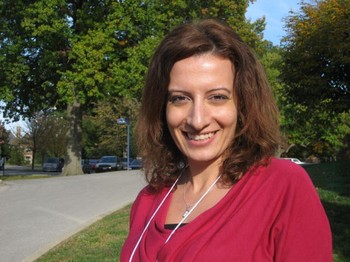Connectedness was a theme for some of the 2012 International Peacemakers of the Presbyterian Church (U.S.A.)’s Peacemaking Program, and it certainly characterized much of Arda Aghazarian’s visit to the United States.
The East Jerusalem resident felt a special kinship while spending time in community with others, especially Armenians in California because her own roots are in Armenia.
“Some of the most meaningful moments were being part of communities,” she said. “It was something unexpected.”
Aghazarian is media and advocacy coordinator for the YWCA and supervisor of a project that encourages the implementation of United Nations Security Council Resolution 1325. The resolution deals with respecting women’s rights during conflicts and supporting their participation in peace negotiations in the aftermath of conflict.
She arrived in the States Sept. 25 and spent time in California, Tennessee and Missouri. Along with talks she gave at various churches and with members of the PC(USA), Aghazarian visited high schools, colleges and retirement homes.
At Westminster College in Fulton, Mo., Aghazarian was a leader in residence and got an opportunity to be part of that community in a close way.
As international peacemakers, “I’d like to think that we emphasized how connected we are,” she said. Although the peacemakers hail from different parts of the world, “we have the same mission and the same vision.”
The Presbyterian Peacemaking Program invites leaders from the denomination’s partner churches around the world to share their experiences as peacemakers in their own lands. This year, 15 International Peacemakers were available to mid-councils, Presbyterian colleges and seminaries for itineration Sept. 21-Oct. 15.
Someone remarked that “you are consciousness-raising,” Aghazarian said. “It is important for us to emphasize the work that we are doing.”
Included among the issues she stressed was awareness of the Kairos Palestine Document, a view on the Israel-Palestine struggle through the lens of Christian Palestinians. People need to know about this document which comes directly from Christians in Palestine, the Holy Land, Aghazarian said.
Since the document’s release, the Kairos Palestine Document Study Guide also was prepared by the Middle East Monitoring Group that was mandated by the 219th General Assembly (2010) of the PC(USA).
“My message (while in the States) was that we think of identity as something that is simple, but it’s not,” Aghazarian said. We must “talk about what it is to be a human being. It should not be limited to our citizenship … but rather the basics of what it means to be a human.”
Toya Richards, a student at Louisville Presbyterian Theological Seminary, writes frequently for Presbyterian News Service.

